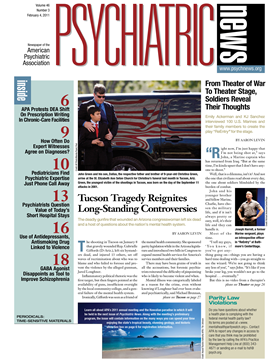As a private-practice psychiatrist grandfathered out of having to be recertified every 10 years, I read the American Board of Psychiatry and Neurology's (ABPN) anticipated procedures for recertification with a sense of relief that I was not affected by the long litany of new requirements. But my relief may be short-lived as the ABPN nuzzles up to various governmental licensing boards. Eventually all psychiatrists may have to go through maintenance of certification (MOC) to practice.
In 2000 the Institute of Medicine published the book To Err Is Human, focusing on medical mistakes, particularly in hospitals. Since then, a whole new industry has arisen to mandate safer health care. Master's-level programs are spitting out self-anointed guardians of public health who are rushing to the front of the line to become the masters of medical care, effectively armed by governmental and quasi-governmental licensing and certifying boards. The practice of medicine seems to be rapidly heading toward cookbook medicine governed by specific practice guidelines created by these new guardians who believe that public health should be taken out of the hands of the individual physician.
With the praiseworthy goal of “lifelong learning,” the ABPN hopes to change the process of maintaining clinical competency from carrot to a stick. The new requirements will entail increasingly more time-consuming hoops that will have to be jumped through throughout the 10-year recertification cycle (see <
http://www.abpn.com/moc_psychiatry.htm>).
What is not clear to me is how piling more regulation on top of that from courts, medical-licensing boards, state legislatures, federal mandates, and insurance panels will improve quality of care. By the same token, I cannot help but notice that nurse practitioners in my state (New Jersey) are rapidly taking over prescription of psychiatric medications in the CMHCs. In theory, they are supervised by a psychiatrist; the reality seems to be different. While psychiatrists are twiddling away their time trying to prove that they are competent to practice, lesser trained clinicians with less onerous requirements are taking over care of patients. It is for this reason that a group of nearly 1,000 APA members forced an APA-wide referendum calling for APA to oppose the new requirements (Psychiatric News, December 3, 2010).
In my opinion, the ABPN's regulatory excess reflects a lapse of protective vigilance by APA. Our APA leaders tend to see themselves as guardians of the public good and have focused on maintaining a favorable image of psychiatry to the public. While that allegiance is laudable, the question that I have is this: Who is going to speak specifically for the psychiatrist and the psychiatrist's needs when it comes to regulatory overload? There are many voices for the public, but who has our backs? If not APA, then who?
DAVID L. SCASTA, M.D. Princeton, N.J.
